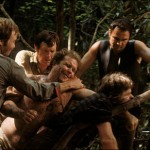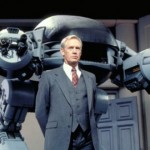 At age 73, Ronny Cox has emerged as a renaissance man. You can still see the co-star of Beverly Hills Cop and RoboCop (and a few movies not about cops, like Bound for Glory) in guest shots on TV shows including Dexter, but these days he spends most of his time on the road. Cox, a singer/songwriter of self-described “folk, western, jazzy-bluesy and just plain cornball stuff,” has released several albums since 1993, and you can give a listen to his latest, Ronny, Rad and Karen, on his website.
At age 73, Ronny Cox has emerged as a renaissance man. You can still see the co-star of Beverly Hills Cop and RoboCop (and a few movies not about cops, like Bound for Glory) in guest shots on TV shows including Dexter, but these days he spends most of his time on the road. Cox, a singer/songwriter of self-described “folk, western, jazzy-bluesy and just plain cornball stuff,” has released several albums since 1993, and you can give a listen to his latest, Ronny, Rad and Karen, on his website.
A touring schedule that takes him to Ireland, Oklahoma, Michigan, Kansas, Nebraska, and his native New Mexico this summer sees him in California on July 5, where he’ll be celebrating the 75th birthday of his friend Ned Beatty. (“He gets there before me every time!!!” he jokes on his site.) Cox and Beatty made their film debuts in John Boorman’s masterful adaptation of James Dickey’s Deliverance (1972), a movie that continues to haunt viewers forty years later. In commemoration of one of its most popular titles, Warner Home Video has reissued Deliverance in a Blu-ray book edition that retains a Boorman commentary track and a documentary from prior releases and adds a new retrospective piece featuring Cox, Beatty, Jon Voight, and Burt Reynolds.
The new Blu-ray also sports a DTS-HD Master Audio 5.1 surround track, the better to enjoy the thrilling “Dueling Banjos.” Cox has never stopped hearing that famed composition, and tells all about the making of the film in a lively new book, Dueling Banjos: The Deliverance of Drew. Prepared to hear from the stern authority figure from so many movies and TV shows, I was relieved to find that Cox was a warm and engaging speaker, more musician than martinet. Cox spoke to Popdose about movies, music, and his canoeing skills. He’ll be appearing at screenings of Deliverance (an Oscar nominee for Best Picture, Director, and Film Editing) at least twice more this year, and if you’re around where he is, go.
When you were making Deliverance, did you have any idea that the film would endure, or were you just trying to survive the filming?
[Laughs] We all knew we were doing something pretty special, not that anyone knows that you’re doing a classic. Every actor wanted to play those four roles, and it was a real coup for Ned and I, who were complete unknowns. It was our first time in front of a camera. We were both theatre guys; I was living in New York at the time, mainly working for Joe Papp. The production wanted unknown actors, and boy, was I ever unknown. We were found before Jon Voight and Burt Reynolds were even settled on, which almost never happens–you get the guys above the title first, then the guys below it.
 How did John Boorman put you at ease behind the camera, especially on such a difficult location shoot?
How did John Boorman put you at ease behind the camera, especially on such a difficult location shoot?
It was almost easy, actually. We rehearsed arduously for two weeks before, going through every scene, improvising through them and talking about them. We also had canoe practice, and I had guitar practice, while Burt and Jon had archery practice. We covered all aspects of it before we ever got started in Georgia. It wasn’t that hard to forget, almost, that you were making a film.Ned and I had never made one, we were outdoors every day, and I have to tell you that when you’re in a canoe you don’t think that much about acting. [Laughs]
Did you have any canoe experience at all?
I had never been in a canoe in my life, nor had anyone else except Ned–and he was the one who was supposed to be the klutz. We were staying at a golf course, and the first time we got into our canoes, two to a canoe, was on a water hazard. It was the most placid water that you had ever seen, not a ripple for miles. We’d been told about this stroke called the draw stroke, where you reach your paddle and move the water toward you to move yourself over. Unfortunately all of us did that draw stroke at the exact same time, so both canoes flipped over just like that; we all went into the water. [Laughs]
When you’re on the water in the film, we feel like we’re in the water, too.
That was the brilliance of John Boorman. We did all of the canoeing ourselves; there were no stuntmen, and fortunately we were all good enough natural athletes to get past that first episode in our practice. We shot the film in sequence, with the easy rapids first and the hard ones toward the end, so that by the time we got to the difficult ones we had been on the water five, six, seven hours a day for five or six weeks. We were all damn good canoers.
Having said that, the Old Town wood canoe that Jon and I had was intended for lakes and not for whitewater. It has a much deeper draft and not much stability. The aluminum canoe that Ned and Burt were in was much more suited to white water–if they had any problem at all going through the rapids, then Jon and I would wreck for sure. Remember at the end of the film there’s that canoe that’s broken in half? Well, the production didn’t have to do that; we did it for them. Jon and I wrecked five canoes.
Have you gone canoeing since the film?
I don’t care if I ever see whitewater again.
 Music is essential to your character, and in Boorman’s autobiography Adventures of a Suburban Boy he says he cast you because you played the guitar.
Music is essential to your character, and in Boorman’s autobiography Adventures of a Suburban Boy he says he cast you because you played the guitar.
I’ve been a guitarist my whole life, and I would say that was “instrumental” (pun intended) in my getting the role. I practiced a lot. Billy Redden, the boy in the “Dueling Banjos” scene, couldn’t play. So we had to pre-record it, then match the playback, and as that wasn’t even Billy’s hand doing the fingering John wanted to cut to my fingers actually playing the right notes. After it was recorded it in Atlanta they gave it to me so I could play it note for note. I played it, but that’s not me on the soundtrack–which probably cost me about a gazillion dollars.
What prompted you to write your book?
Deliverance changed my life so dramatically I needed to write it. More people want to talk about it than all of the films I’ve ever done, and I’ve met many people who have stories about it that are totally off-the-wall lies. [Laughs] If I run into one more guy who claims to have done the stuntwork on this, or who claims to have been the music coordinator, or did this or did that…I mean, it’s incredible.
Forty years later I think people recognize the real artistic excellence of the film. The rape scene and the violent, action adventure elements were shocking at that time, as if it were a horror picture in a way. When you look at it today you see the incredible artistic choices that John Boorman made–the way in which it was shot is both naturalistic and surrealistic–and understand the metaphor of the rape of Bobby and the raping of the land and the river. It resonates. Particularly, I think, on this new Blu-ray; so many people have seen it on television, all cut up, so it looks as if we killed the mountain guy for teasing us. [Laughs.]
 At the end of the book, you identify yourself as a “hardcore liberal Democrat,” yet after Deliverance you’ve played so many hard-nosed conservative figureheads.
At the end of the book, you identify yourself as a “hardcore liberal Democrat,” yet after Deliverance you’ve played so many hard-nosed conservative figureheads.
[Laughs] Anyone who doesn’t know me assumes I must be this radical right-wing guy, somewhere to the right of Sarah Palin, then they find out I’m really left-wing. My favorite roles to play are the bad guys, because they make the most interesting choices. Not the ones I live my life by, of course.
If I’m at all successful in playing the parts I played in RoboCop or Total Recall, it’s because I had a residual career as “America’s Dad,” so you expect the guys I play to be good. But when they turn out to be bad, well, they’re really bad. Someone once said to me, “Ronny, you playing a villain is like having an astronaut that’s gone bad.”
How did music come to displace acting in your career?
I lost my wife, Mary, about five years ago (they had been married for 46 years). I’m not rich, but I’ve got enough money and I’m prudent in my spending. What gives me the most pleasure in my life is playing music, so I turn down about 90% of the acting jobs I’m offered these days and do between 100-125 music gigs per year. I love acting, but no matter what acting you’re doing, be it stage, screen, or TV, there must be an imaginary fourth wall between you and the audience. You can’t get through the lens or step off the stage. The kind of music I do, where I tell stories as well–there’s a possibility of a profound one-on-one sharing.
The song that closes your new album, “The Night John Huston Died,” is very affecting, and obviously autobiographical. But in what ways?
The film that made me want to become an actor was The Treasure of the Sierra Madre. I saw it when I was 12 or 13, at a matinee in New Mexico, where I grew up. And I didn’t come home. At 9pm my parents thought to look for me at the theater, where I had watched the movie all day. I became a huge fan of John’s.
Late in John’s life I got a chance to meet him. He liked to play poker, and he had heard that I liked to play, so in the year that he was dying he would invite a group of us over in the afternoons to play with him. I mean, I got to play poker with John Huston. He and I became really close friends. In some ways he was like a surrogate father figure, so that song is very important to me.
Music cuts through to the heart like nothing else does.





Comments